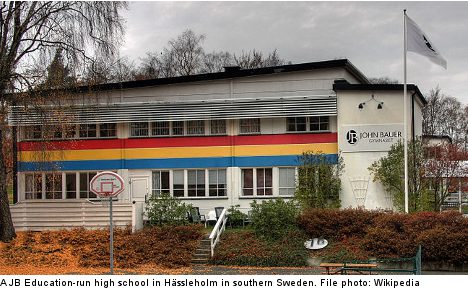“We think it’s horrible that it’s happening like this; that we’ve been left hanging in uncertainty two weeks before graduation,” Mattias Hallberg, chair of the association of Sweden’s student unions, Sveriges Elevkårer, told the TT news agency.
In a statement released on Thursday, JB Education announced it was quitting its primary and secondary school operations in Sweden due to a drop in the number of students.
According to JB Education CEO Anders Hultin, the company runs 31 upper secondary schools in Sweden. In February, JB announced it was withdrawing from seven of the schools. While three have found new owners, the remaining four have started the process of shutting down.
Of the 24 remaining schools run by JB, 21 have found new owners, while the remaining three risk being shut down.
“When we discovered the applicant figures for the next academic year looked as they did, I realized that the scenario we’d been working toward wasn’t sustainable. That changed the game plan,” he told TT.
“One the one hand, I’m devastated that the company I’ve managed for a short time won’t survive. It’s extremely regrettable that it will affect the students. On the other hand, I’m relieved that so many upper secondary schools will get a new start with new owners who can continue to develop them.”
However, news that JB, which enrolls more than 10,000 students at its schools across the country, was winding down its operations in Sweden didn’t sit well with students.
“It’s going to be really tough to spend the whole summer trying to figure out where you’re going to start school in the autumn,” Hallberg of the student union association told TT, adding he thinks JB’s handling of the situation has been “irresponsible”.
“They’ve promised these students something they can’t deliver.”
Despite assurances from JB that it had found “strong” owners for most of its schools, it remains unclear whether the new owners will be approved.
“We review their financial stability, the number of potential students, and other factors related to their ability to continue operations in the long term, so that students don’t risk having to change schools in the midst of their studies,” Carina Larsson, a spokeswoman for Sweden’s Schools’ Inspectorate (Skolinspektionen) told TT.
Social Democrat education policy spokesman Ibrahim Baylan said he’s not surprised that JB is shutting down, blaming “20 years of centre-right policies” that have resulted in a saturated market in free schools.
“I hope that this situation, which becomes crystal clear in light of JB shutting down or selling schools, shows that the system of what in practice amounts to the free establishment of schools, is unsustainable,” he told TT.
JB Education, previously known as John Bauer Gymnasiet, opened its first school in Sweden in Jönköping, central Sweden, in 2000. It currently operates schools in 20 locations around the country. In 2008, the company was sold to Danish venture capital firm Axcel.
TT/The Local/dl



 Please whitelist us to continue reading.
Please whitelist us to continue reading.
Member comments